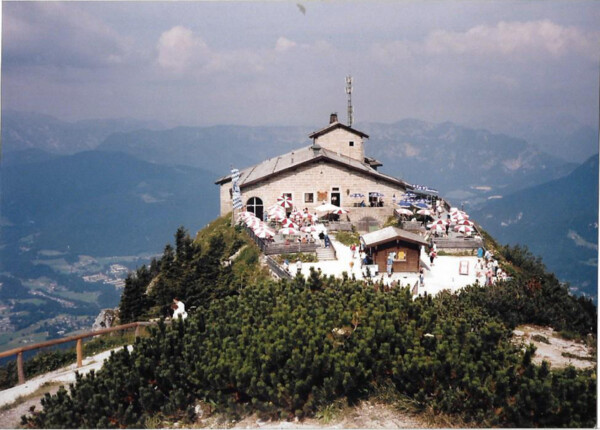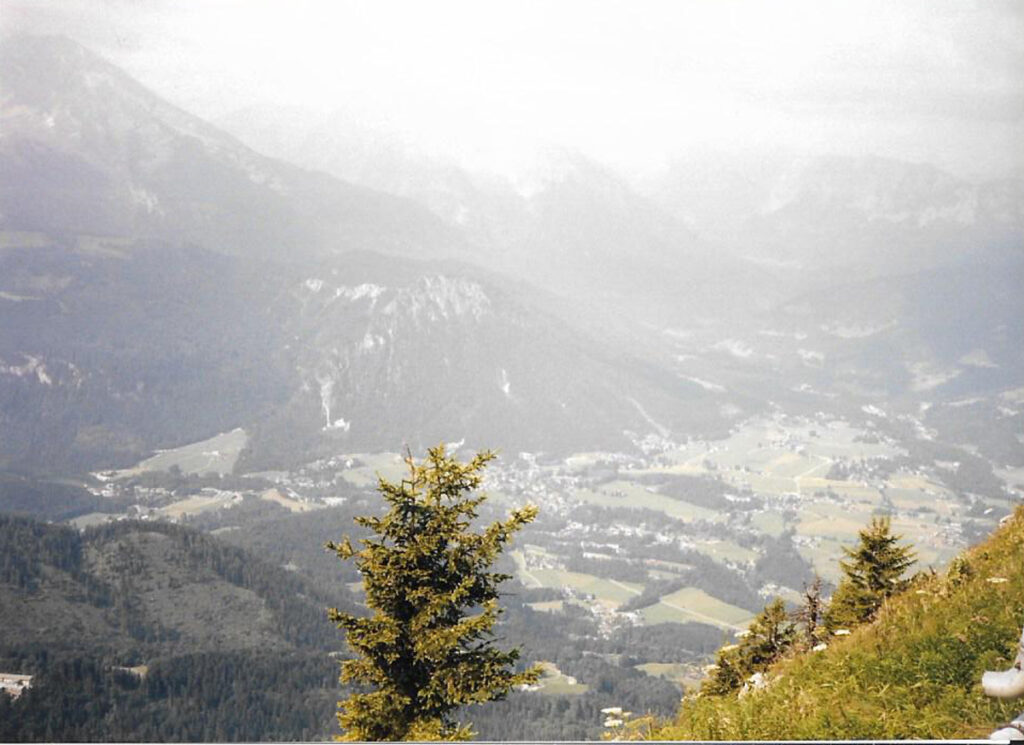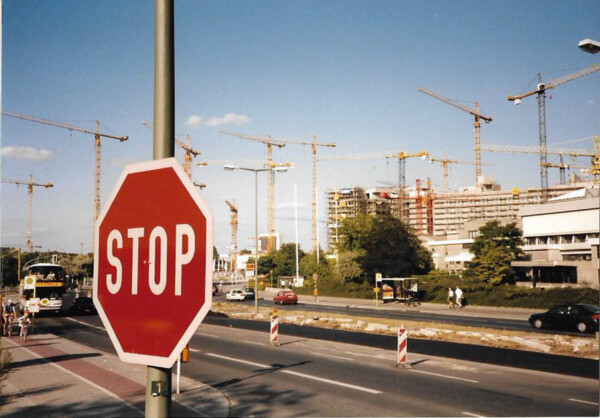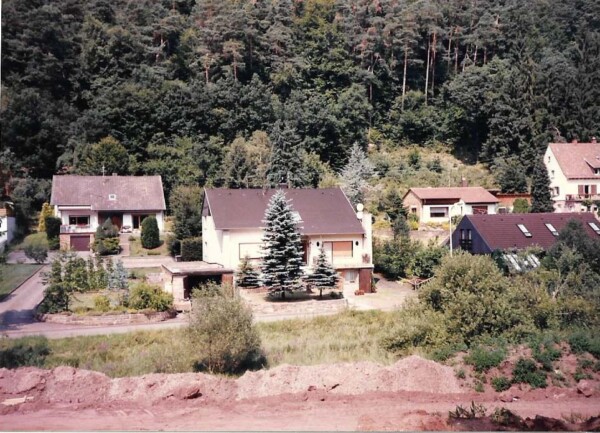Trip to Germany: Amid great beauty lie the seeds of a horrible ugliness

This is a look back at the restaurant that occupies Eagle's Nest, Adolf Hitler's mountaintop retreat in Bavaria during World War II. Image by Del Stone Jr.
A river runs through the little town of Bertchesgaden, Germany – a clear, blue ribbon of foam, as pretty as a river can be.
The river tumbles down from mountains that ring the village like a crown reaching into the sky. Granite peaks are softened by forest and meadow and wildflower.
Everywhere is a picture postcard vista, so breathtaking your heart aches to look. River, sky, mountain, all done up in pure, unsullied beauty.

Surely this must be heaven.
Unbelievably, this once was hell.
Because atop one of these lovely peaks is a single house, inconspicuous as a single cell of cancer.
The house is called Eagle’s Nest. It is the old mountain redoubt of Adolf Hitler, chancellor of the Third Reich, would-be master of the world, and murderer of millions.
Such monstrous ugliness, juxtaposed with such stark beauty, is hard to conceive. Yet at this very spot, Hitler formulated his plans for genocide. No sane person could resist the charms of Bavaria. Hitler’s apparent immunity makes him all the more horribly alien.
Some day, you must see Eagle’s Nest.
A convoy of tour buses leaves a depot in town, every hour and darn well on the hour, to ferry tourists up the mountain. It is a trip riders are happy to leave to drivers.
The diesel engine strains as the bus labors up the steep grade. A narrow switchback cuts through a forest of evergreen before emerging onto the mountain’s rocky flank.

There, the ride becomes more perilous, almost hair-raising, as the bus negotiates curves that send its riders swinging out over the edge and staring into chasms of rocky spires and spiky trees whittled to nothing by arid wind and soil.
A huge landing has been carved from the mountain, and there you disembark to walk through a dank, freezing tunnel, along the same path taken by Hitler’s Mercedes 60 years ago.
You wait in line for an elevator, which takes you through the mountain to Eagle’s Nest.
It is now a restaurant, with the mandatory patio café. Just off the café is a kiosk that sells film and postcards. You’ll want both.
Because the view is nothing short of spectacular. From Eagle’s Nest, you can see Austria. You can see Australia, for that matter. The entire Earth seems laid out before you, spreading in a gauzy quilt of green plains, pearly rivers, icy-cold lakes and the slate fangs of mountains.
On a rise above the patio, a cross has been erected to memorialize all the victims of World War II. Above that, rocks offer a more adrenaline-inducing perspective on the chasms and cliffs around you.

Below and all around are steeply banks meadows sprinkled with gorgeous flowers that waggle in the cool wind as they suck in all that warm mountain sunshine.
Gazing out over all this, you think of peace, and serenity. Not Stukas and gas chambers.
You appreciate the miracle of creation, not the horror of destruction.
If you come here, you will learn that even within the grasp of fantastic beauty, seeds of unknowable ugliness may sprout and take root.
It is a lesson you must never, ever forget.
This column was published in the Sept. 24, 1997 edition of the Northwest Florida Daily News and is used with permission.

About the author:
Del Stone Jr. is a professional fiction writer. He is known primarily for his work in the contemporary dark fiction field, but has also published science fiction and contemporary fantasy. Stone’s stories, poetry and scripts have appeared in publications such as Amazing Stories, Eldritch Tales, and Bantam-Spectra’s Full Spectrum. His short fiction has been published in The Year’s Best Horror Stories XXII; Alfred Hitchcock’s Mystery Magazine; the Pocket Books anthology More Phobias; the Barnes & Noble anthologies 100 Wicked Little Witch Stories, Horrors! 365 Scary Stories, and 100 Astounding Little Alien Stories; the HWA anthology Psychos; and other short fiction venues, like Blood Muse, Live Without a Net, Zombiesque and Sex Macabre. Stone’s comic book debut was in the Clive Barker series of books, Hellraiser, published by Marvel/Epic and reprinted in The Best of Hellraiser anthology. He has also published stories in Penthouse Comix, and worked with artist Dave Dorman on many projects, including the illustrated novella “Roadkill,” a short story for the Andrew Vachss anthology Underground from Dark Horse, an ashcan titled “December” for Hero Illustrated, and several of Dorman’s Wasted Lands novellas and comics, such as Rail from Image and “The Uninvited.” Stone’s novel, Dead Heat, won the 1996 International Horror Guild’s award for best first novel and was a runner-up for the Bram Stoker Award. Stone has also been a finalist for the IHG award for short fiction, the British Fantasy Award for best novella, and a semifinalist for the Nebula and Writers of the Future awards. His stories have appeared in anthologies that have won the Bram Stoker Award and the World Fantasy Award. Two of his works were optioned for film, the novella “Black Tide” and short story “Crisis Line.”
Stone recently retired after a 41-year career in journalism. He won numerous awards for his work, and in 1986 was named Florida’s best columnist in his circulation division by the Florida Society of Newspaper Editors. In 2001 he received an honorable mention from the National Lesbian and Gay Journalists Association for his essay “When Freedom of Speech Ends” and in 2003 he was voted Best of the Best in the category of columnists by Emerald Coast Magazine. He participated in book signings and awareness campaigns, and was a guest on local television and radio programs.
As an addendum, Stone is single, kills tomatoes and morning glories with ruthless efficiency, once tied the stem of a cocktail cherry in a knot with his tongue, and carries a permanent scar on his chest after having been shot with a paintball gun. He’s in his 60s as of this writing but doesn’t look a day over 94.
Contact Del at [email protected]. He is also on Facebook, twitter, Pinterest, tumblr, TikTok, and Instagram. Visit his website at delstonejr.com .

Germans refer to Berlin as the world's biggest construction project. Image courtesy of Del Stone Jr.
The drive from Leipzig to Berlin, in what was once East Germany, carries you from the past into the future.
The past begins on the autobahn, which in some places still uses the cobblestone-like ext and entry ramps of the original road network built by prewar Germany.
If you take the former supply route that served as a lifeline for West Berlin during the Cold War, you will see what remains of the old checkpoints, and the guard towers where East German soldiers made sure nobody got on or got off the autobahn.
But as you near Berlin, a wonderful thing happens.
You start to see the future.

The road smoothes out. The Germans are rebuilding the crumbled infrastructure of the East, replacing uninspired communist workmanship with modern highways and utilities built to contemporary standards.
But even more amazing is the change in atmosphere.
Architecture shows an artistic flair. Buildings bloom with color. The night fairly glows with neon. The drab, neglected and crumbling shadow of socialism gives way to a vibrancy that exists only when people are allowed to freely express their thoughts.
Berlin is that way too, a city still divided by the past and the future. But today’s Germans are racing to put that division behind them.
Downtown Berlin is very much like a college town, with tree-lined streets, sidewalk cafes, and a bright, colorful funkiness that speaks of art, style and culture.
The day we traveled to Berlin, a street festival was unspooling along the main drag. It was a wonderful procession of bizarre kiosks, wild music, crazy dancing, exotic foods, and it was populated with a fascinating diversity of people – gawkers like us, leather-clad cross-dressers, baggy-trousered skinheads, and Bavarian gents in lederhosen.
Amid all the modernity is history, much of it recent.
We drove beneath the Brandenburg Gate, and stopped to photograph Checkpoint Charlie. Even a stretch of the old Wall remains, although it has been mostly scavenged away.

Germans call Berlin the world’s largest construction project – not without reason. Cranes rear stork-like over the buildings, and everywhere you look, skyscrapers are going up. Even the Reichstag, the old parliamentary building, has been rebuilt and is nearing completion.
But if you drive along the old border you can see the difference – the glaring difference – between East and West, communism and capitalism, the past and the future. The buildings on one side of the road are lively and well-kept; the buildings on the other side are run-down and depressing.
Most gratifying to me was the Free Press building, which towered above the skyline on the border. Our guide told us the communists were so enraged by the newspaper building that they constructed a series of skyscrapers on their side of the border to block the view.
Berlin retains much of its old allure. The night of our stay, we sat out on the balcony of our apartment, chugging on huge Cuban stogies and speculating about life in what had been the spy capital of the universe. A Polizi van and its shrill siren completed the aura of mystery.
Berlin is rising anew, and it is as lovely a city as you’ll ever see.
The column was originally published in the September 17, 1997 edition of the Northwest Florida Daily News and is used with permission.
About the author:
Del Stone Jr. is a professional fiction writer. He is known primarily for his work in the contemporary dark fiction field, but has also published science fiction and contemporary fantasy. Stone’s stories, poetry and scripts have appeared in publications such as Amazing Stories, Eldritch Tales, and Bantam-Spectra’s Full Spectrum. His short fiction has been published in The Year’s Best Horror Stories XXII; Alfred Hitchcock’s Mystery Magazine; the Pocket Books anthology More Phobias; the Barnes & Noble anthologies 100 Wicked Little Witch Stories, Horrors! 365 Scary Stories, and 100 Astounding Little Alien Stories; the HWA anthology Psychos; and other short fiction venues, like Blood Muse, Live Without a Net, Zombiesque and Sex Macabre. Stone’s comic book debut was in the Clive Barker series of books, Hellraiser, published by Marvel/Epic and reprinted in The Best of Hellraiser anthology. He has also published stories in Penthouse Comix, and worked with artist Dave Dorman on many projects, including the illustrated novella “Roadkill,” a short story for the Andrew Vachss anthology Underground from Dark Horse, an ashcan titled “December” for Hero Illustrated, and several of Dorman’s Wasted Lands novellas and comics, such as Rail from Image and “The Uninvited.” Stone’s novel, Dead Heat, won the 1996 International Horror Guild’s award for best first novel and was a runner-up for the Bram Stoker Award. Stone has also been a finalist for the IHG award for short fiction, the British Fantasy Award for best novella, and a semifinalist for the Nebula and Writers of the Future awards. His stories have appeared in anthologies that have won the Bram Stoker Award and the World Fantasy Award. Two of his works were optioned for film, the novella “Black Tide” and short story “Crisis Line.”
Stone recently retired after a 41-year career in journalism. He won numerous awards for his work, and in 1986 was named Florida’s best columnist in his circulation division by the Florida Society of Newspaper Editors. In 2001 he received an honorable mention from the National Lesbian and Gay Journalists Association for his essay “When Freedom of Speech Ends” and in 2003 he was voted Best of the Best in the category of columnists by Emerald Coast Magazine. He participated in book signings and awareness campaigns, and was a guest on local television and radio programs.
As an addendum, Stone is single, kills tomatoes and morning glories with ruthless efficiency, once tied the stem of a cocktail cherry in a knot with his tongue, and carries a permanent scar on his chest after having been shot with a paintball gun. He’s in his 60s as of this writing but doesn’t look a day over 94.
Contact Del at [email protected]. He is also on Facebook, twitter, Pinterest, tumblr, TikTok, and Instagram. Visit his website at delstonejr.com .

Greenery is abundant, even in German cities. Image courtesy of Del Stone Jr.
When I got back from my trip to Europe, Staff Writer Bruce Rolfsen asked me, “How many columns are you gonna milk this trip for?”
I answered, “Oh, about 14.”
He laughed. I laughed.
As I mentally laid out Column No. 3. And 4. And 5. And 6, 7, 8, …
The serial columnist strikes again. But if you’ll indulge me, I’d like to spend the next few weeks telling you about what I saw over there, beginning with this collection of unrelated impressions and observations about Germany.
– The first person I encountered at the Frankfurt airport was an immigration official who wanted to see my passport. He looked it over with a critical eye. Then, in a sinister, Gert Frobian voice, he murmured, “Your papers are NOT in order.”
“GAAAA?” I asked.
“Yes. I show you,” he said, and pointed at a line on my passport – the line for my signature.
It was blank.
He handed me a pen.
What I really needed was a nitroglycerine pill.
– Germany is an amazingly clean country. Not a speck of litter anywhere, except outside a Pizza Hut, where several English-language fliers had been strewn across a sidewalk. I collected them all out of shame for my language.
– The cities and villages were thick with trees and flowers, an amazing abundance of greenery and a delightful dearth of asphalt. It seemed every window supported a flowerbox overflowing with geraniums, and every patio was surrounded by trees and blooms.

The countryside is heavily cultivated with corn, sunflowers and wheat. But huge tracts of forested land separate the fields, and in many places forest predominates. Vineyards dot the hillsides, giving way to trees farther up the hilltops.
Even in the cities, trees are abundant, which is why the urban areas never seemed hot, noisy or congested.
It was very clear to me the Germans had learned the importance of co-existing with nature.
– American urban planners, especially those who pass for such in these parts, should take a junket to southern Germany for an immediate education in municipal logic.
The cities are neat, tidy, and use space efficiently. Seldom do you see the desolate stretches of pavement, crazy quilt of construction techniques and the grotesque sprawl that blight American municipalities. Development was limited to distinct borders, an embodiment of the greenway concept, and the wisdom of that philosophy was glaringly apparent; livable cities that had not been built at the expense of surrounding wild places.
(Maybe The Nature Conservancy could better spend its limited funds on airplane tickets for the local developers.)
– Only one place in Germany reminded me of home: the crumbling, bankrupt warrens of the former East Germany. Roads were in ill repair and drab apartment complexes reared above the horizon – all of it was depressingly familiar.
– The Germans were quite friendly, and virtually everywhere I went I was able to find somebody who could speak passable English. Having only a few words and phrases in my German lexicon, I was appreciative of their language skills, and embarrassed by my own.
This column was originally published in the September 10, 1997 edition of the Northwest Florida Daily News and is used with permission.
About the author:
Del Stone Jr. is a professional fiction writer. He is known primarily for his work in the contemporary dark fiction field, but has also published science fiction and contemporary fantasy. Stone’s stories, poetry and scripts have appeared in publications such as Amazing Stories, Eldritch Tales, and Bantam-Spectra’s Full Spectrum. His short fiction has been published in The Year’s Best Horror Stories XXII; Alfred Hitchcock’s Mystery Magazine; the Pocket Books anthology More Phobias; the Barnes & Noble anthologies 100 Wicked Little Witch Stories, Horrors! 365 Scary Stories, and 100 Astounding Little Alien Stories; the HWA anthology Psychos; and other short fiction venues, like Blood Muse, Live Without a Net, Zombiesque and Sex Macabre. Stone’s comic book debut was in the Clive Barker series of books, Hellraiser, published by Marvel/Epic and reprinted in The Best of Hellraiser anthology. He has also published stories in Penthouse Comix, and worked with artist Dave Dorman on many projects, including the illustrated novella “Roadkill,” a short story for the Andrew Vachss anthology Underground from Dark Horse, an ashcan titled “December” for Hero Illustrated, and several of Dorman’s Wasted Lands novellas and comics, such as Rail from Image and “The Uninvited.” Stone’s novel, Dead Heat, won the 1996 International Horror Guild’s award for best first novel and was a runner-up for the Bram Stoker Award. Stone has also been a finalist for the IHG award for short fiction, the British Fantasy Award for best novella, and a semifinalist for the Nebula and Writers of the Future awards. His stories have appeared in anthologies that have won the Bram Stoker Award and the World Fantasy Award. Two of his works were optioned for film, the novella “Black Tide” and short story “Crisis Line.”
Stone recently retired after a 41-year career in journalism. He won numerous awards for his work, and in 1986 was named Florida’s best columnist in his circulation division by the Florida Society of Newspaper Editors. In 2001 he received an honorable mention from the National Lesbian and Gay Journalists Association for his essay “When Freedom of Speech Ends” and in 2003 he was voted Best of the Best in the category of columnists by Emerald Coast Magazine. He participated in book signings and awareness campaigns, and was a guest on local television and radio programs.
As an addendum, Stone is single, kills tomatoes and morning glories with ruthless efficiency, once tied the stem of a cocktail cherry in a knot with his tongue, and carries a permanent scar on his chest after having been shot with a paintball gun. He’s in his 60s as of this writing but doesn’t look a day over 94.
Contact Del at [email protected]. He is also on Facebook, twitter, Pinterest, tumblr, TikTok, and Instagram. Visit his website at delstonejr.com .

The author snapped this photo of the Delta jetliner he flew aboard to Germany. In the column he referred to it as a DC-10 but in all probability it was an MD-11. Image courtesy of Del Stone Jr.
A large group of my friends – large enough to physically overpower me – escorted me to the airport for my recent trip to Europe.
They know I’m a weenie about flying (as if I hadn’t collapsed into their arms the week before, begging them to pray for my soul) and they wanted to make sure I actually got on the airplane so I couldn’t fake the trip, like the government did with the moon landings and the Mars mission.
We got to the baggage check-in and I told the lady at the desk, “I’m a gutless weenie when it comes to flying,” and she gave me a fishy stare and declared, “I’m making a note of that on your boarding pass.”
Then my friends dragged me to the gate. They announced my plane was ready to go and my friends pushed me forward and suddenly I needed to spend some quality time in the toilet.
“Hello. It’s the gutless weenie,” chirped the boarding clerk as he examined my pass. I should have punched him, but I was too afraid.
We got aboard. I’d asked for an aisle seat, preferably in the no-visibility section. But the airline, in its infinite wisdom, had assigned window seats to a pair of newlyweds, and THEY wanted to sit together. So while the sungglebunnies made goo-goo eyes, I got the window seat next to a spooky-looking woman of massive proportions who hogged the armrests.
We took off into Cecil B. DeMille-style thunderstorms. The plane clearly was not Charlton Heston. Our pilot said it was too turbulent to serve drinks – not too turbulent to throw handfuls of Valiums down the aisle, which would have been fine by me.
An hour later we landed at Hartsfield in Atlanta. I hurried to my connecting flight, a big DC-10 that would carry us nonstop to Frankfurt, Germany. I noticed it only had THREE engines. Could it fly all the way to Germany on THREE engines? I asked myself. No, dummy, Abusive Del answered. Halfway across they’re gonna throw your butt into the Atlantic.
As we were boarding, I met a fellow Fort Walton Beach-ite, Cat Stevens (no, not the singer – this was the REAL Cat Stevens) and her son. It was nice to know somebody famous from home would be along for the ride.
This airplane was, as they say in Brooklyn, YUGE. And even cooler, it had a TELEPHONE in the back of the seat. I couldn’t make the damn thing work, which was REALLY cool – I spent most of the trip just trying to place a TELEPHONE CALL.
Coolest of all? Soon as we took off, night happened. Couldn’t see a thing. Might as well have been on a bus. Fort the first time in my life, I slept on an airplane – well, I TRIED to sleep.
“Wake up, sir, its time for your dinner.”
“Wake up, sir, it’s time for your snack.”
“Wake up, sir, it’s time for your hot towel.”
If THAT’s all I could complain about, it must have been a pretty good airplane ride.
Actually, I’ll complain about one more thing: My fellow passengers hogged the bathroom. Right before landing, I wanted to brush my teeth and “refresh” my deodorant. So did everyone else. By the time I got in there we were pulling up to the gate.
But I’d made it – eight hours in a plane and not one single nervous breakdown.
Little did I know. …
The column was previously published in the September 3, 1997 edition of the Northwest Florida Daily News and is used with permission.
About the author:
Del Stone Jr. is a professional fiction writer. He is known primarily for his work in the contemporary dark fiction field, but has also published science fiction and contemporary fantasy. Stone’s stories, poetry and scripts have appeared in publications such as Amazing Stories, Eldritch Tales, and Bantam-Spectra’s Full Spectrum. His short fiction has been published in The Year’s Best Horror Stories XXII; Alfred Hitchcock’s Mystery Magazine; the Pocket Books anthology More Phobias; the Barnes & Noble anthologies 100 Wicked Little Witch Stories, Horrors! 365 Scary Stories, and 100 Astounding Little Alien Stories; the HWA anthology Psychos; and other short fiction venues, like Blood Muse, Live Without a Net, Zombiesque and Sex Macabre. Stone’s comic book debut was in the Clive Barker series of books, Hellraiser, published by Marvel/Epic and reprinted in The Best of Hellraiser anthology. He has also published stories in Penthouse Comix, and worked with artist Dave Dorman on many projects, including the illustrated novella “Roadkill,” a short story for the Andrew Vachss anthology Underground from Dark Horse, an ashcan titled “December” for Hero Illustrated, and several of Dorman’s Wasted Lands novellas and comics, such as Rail from Image and “The Uninvited.” Stone’s novel, Dead Heat, won the 1996 International Horror Guild’s award for best first novel and was a runner-up for the Bram Stoker Award. Stone has also been a finalist for the IHG award for short fiction, the British Fantasy Award for best novella, and a semifinalist for the Nebula and Writers of the Future awards. His stories have appeared in anthologies that have won the Bram Stoker Award and the World Fantasy Award. Two of his works were optioned for film, the novella “Black Tide” and short story “Crisis Line.”
Stone recently retired after a 41-year career in journalism. He won numerous awards for his work, and in 1986 was named Florida’s best columnist in his circulation division by the Florida Society of Newspaper Editors. In 2001 he received an honorable mention from the National Lesbian and Gay Journalists Association for his essay “When Freedom of Speech Ends” and in 2003 he was voted Best of the Best in the category of columnists by Emerald Coast Magazine. He participated in book signings and awareness campaigns, and was a guest on local television and radio programs.
As an addendum, Stone is single, kills tomatoes and morning glories with ruthless efficiency, once tied the stem of a cocktail cherry in a knot with his tongue, and carries a permanent scar on his chest after having been shot with a paintball gun. He’s in his 60s as of this writing but doesn’t look a day over 94.
Contact Del at [email protected]. He is also on Facebook, twitter, Pinterest, tumblr, TikTok, and Instagram. Visit his website at delstonejr.com .